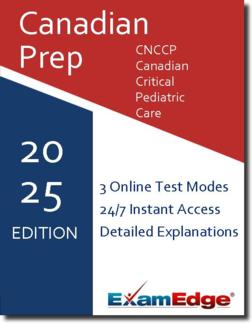CNCCP - Canadian Critical Pediatric Care (CNCCP) Practice Tests & Test Prep by Exam Edge - FAQ
Based on 34 Reviews
- Real Exam Simulation: Timed questions and matching content build comfort for your CNCCP - Canadian Critical Pediatric Care test day.
- Instant, 24/7 Access: Web-based Canadian Critical Pediatric Care Nursing Examination practice exams with no software needed.
- Clear Explanations: Step-by-step answers and explanations for your Canadian exam to strengthen understanding.
- Boosted Confidence: Reduces anxiety and improves test-taking skills to ace your Canadian Critical Pediatric Care Nursing Examination (CNCCP).

Why should I use Exam Edge to prepare for the Canadian Critical Pediatric Care Nursing Examination Exam?
FAQ's for Exam Edge Canadian Critical Pediatric Care Nursing Examination practice tests
- Comprehensive content: Exam Edge's Canadian Critical Pediatric Care Nursing Examination practice tests are created specifically to prepare you for the real exam. All our CNCCP - Canadian Critical Pediatric Care practice test questions parallel the topics covered on the real test. The topics themselves are covered in the same proportions as the real test too, based on outlines provided by the Canadian Nursing in their CNCCP - Canadian Critical Pediatric Care test guidelines.
- Realistic practice: Our CNCCP - Canadian Critical Pediatric Care practice exams are designed to help familiarize you with the real test. With the same time limits as the real exam, Our Canadian Nursing practice tests enable you to practice your pacing and time management ahead of test day.
- Detailed explanations: As you complete your practice tests, we show you which questions you answered correctly and which ones you answered incorrectly, in addition to providing you with detailed step-by-step explanations for every single Canadian Critical Pediatric Care Nursing Examination practice exam question.
- Performance insights: After you complete a practice test, we provide you with your raw score (how many you answered correctly) and our estimate of the CNCCP - Canadian Critical Pediatric Care score you would have received if you had taken the real test.
- Ease of access: Because all Our Canadian Nursing practice tests are web-based, there is no software to install. You can take CNCCP - Canadian Critical Pediatric Care practice exams on any device with access to the internet, at any time.
- Flexible use: If you must pause while taking one of Our Canadian Nursing practice exam, you can continue right where you left off. When you continue the test, you will start exactly where you were, and with the same amount of time you had remaining.
- Thousands of unique questions: We offer 10 different online practice exams with 1,000 unique questions to help you prepare for your Canadian Critical Pediatric Care Nursing Examination !
- Low cost: The cost of ordering 5 practice tests is less than the cost of taking the real CNCCP - Canadian Critical Pediatric Care test. In other words, it would be less expensive to order 5 practice tests than to retake the real Canadian Critical Pediatric Care Nursing Examination exam!
- Our trusted reputation: As a fully accredited member of the Better Business Bureau, we uphold the highest level of business standards. You can rest assured that we maintain all of the BBB Standards for Trust.
- Additional support: If you need additional help, we offer specialized tutoring. Our tutors are trained to help prepare you for success on the Canadian Critical Pediatric Care Nursing Examination exam.
What score do I need to pass the CNCCP - Canadian Critical Pediatric Care Exam?
To pass the Canadian Critical Pediatric Care Nursing Examination test you need a score of 80.
The range of possible scores is 0 to 100.
How do I know the practice tests are reflective of the actual Canadian Critical Pediatric Care Nursing Examination ?
At Exam Edge, we are proud to invest time and effort to make sure that Our Canadian Nursing practice tests are as realistic as possible. Our practice tests help you prepare by replicating key qualities of the real test, including:
- The topics covered
- The level of difficulty
- The maximum time-limit
- The look and feel of navigating the exam
Do you offer practice tests for other Canadian Nursing subjects?
Yes! We offer practice tests for 11 different exam subjects, and there are 215 unique exams utilizing 21500 practice exam questions. Every subject has a free sample practice test you can try too!
CDRE - Canadian Dietetic Registration Examination
Canadian Dietitian Registration Exam (CDRE)
Practice Tests
Canadian Nursing Exams
Canadian Cardiac Vascular Nursing (CCN)
Practice Tests
Canadian Critical Care Nursing Examination (CNCC)
Practice Tests
CNCCP - Canadian Critical Pediatric Care (CNCCP)
Practice Tests
Canadian Family Nurse Practitioner Examination
Practice Tests
Canadian Gerontological Nursing Examination (GNC)
Practice Tests
Canadian Medical Surgical Nursing Examination (CMSN)
Practice Tests
CNPE: F/AA
Practice Tests
CPNRE (CPNRE)
Practice Tests
CPMHN - Canadian Psych/Mental Health Nursing (CPMHN)
Practice Tests
Canadian Registered Nurse Examination
Practice Tests
To order tests, or take a sample test, for a different subject:
Click on ' Name on the Exam Name' You will be take to the orders page
How do I register for the real Canadian Nursing?
For up-to-date information about registration for the Canadian Nursing, refer to the Canadian Nursing website.


